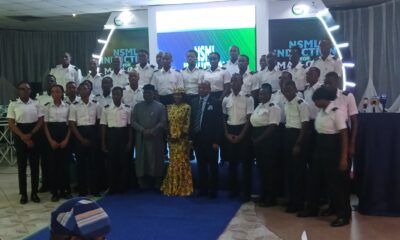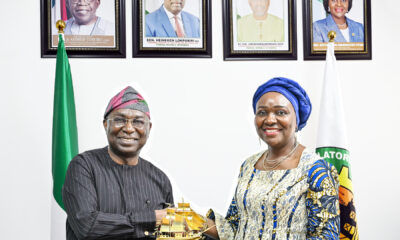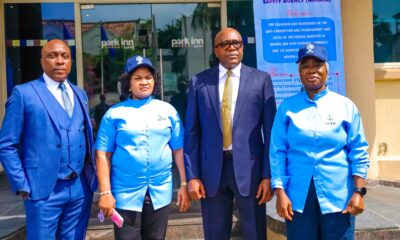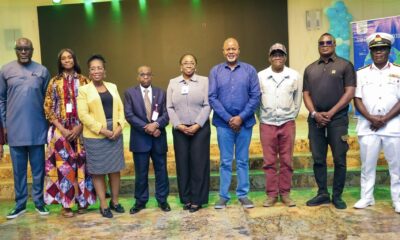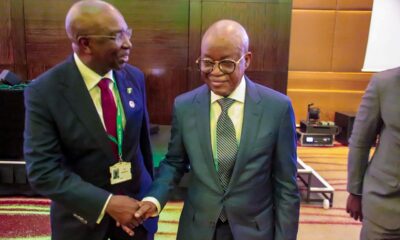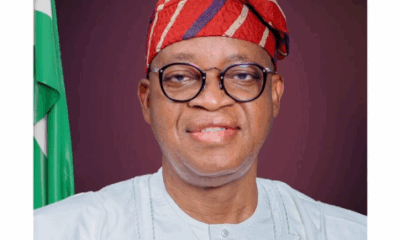Maritime
IMO Council Seat: Place of Maritime Training (2)
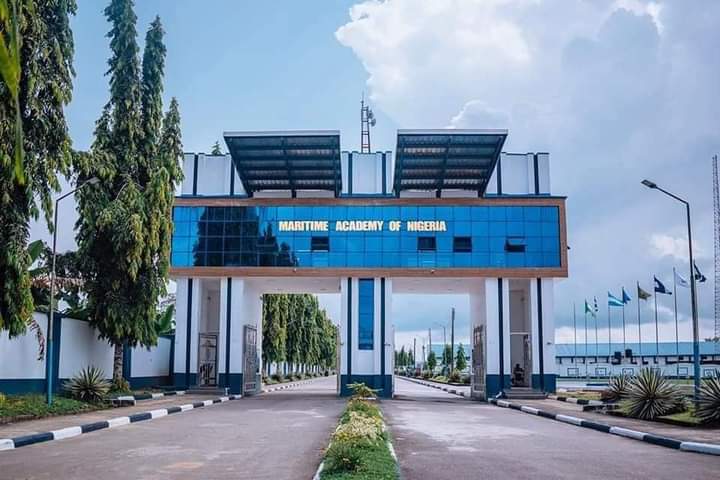
BY EGUONO ODJEGBA
The Pinnacle Time in a recent article called attention to the importance of maritime training and its strategic position especially with regards to Nigeria’s quest for membership of the Security Council of the International Maritime Organisation (IMO).
This sequel merely attempt to guide us to understand this strategic position of the Maritime Academy of Nigeria (MAN) as a cornerstone of Nigeria’s IMO Council campaign, especially so, as the campaign gathers steam under the supervision of the Federal Ministry of Marine and Blue Economy.
While some sources holds the view that although maritime training has not been identified as a critical campaign requirement and demand by the IMO, pundits however posit that it provides a reliable nexus for consideration and can indeed influence voters perception and induce impact voting decision.
Whether we like it or not, the Maritime Academy of Nigeria has for a long time already become a symbol of regional leadership and cannot be wished away in the evaluation of key programmes; especially on the important issues such as Nigeria’s quest for the IMO Council Seat.
It is instructive to note that the Maritime Academy of Nigeria’s transformation since 2017 aligns powerfully with Nigeria’s broader maritime ambitions—especially those tied to economic diversification, regional leadership, and global competitiveness.
Alignment with National Maritime Goals
As the pioneer, sole federal government maritime academy, its mandate and achievements in the following areas cannot be ignored.
- Human Capital Development
Nigeria aims to become a regional hub for maritime expertise, and MAN’s upgraded training facilities and curriculum directly support this.
The Academy’s focus on marine engineering, nautical sciences, and logistics prepares cadets for critical roles in shipping, port operations, and offshore services.
- Support for the Blue Economy
The Federal Ministry of Marine and Blue Economy emphasizes sustainable use of ocean resources. MAN’s training in environmental safety, navigation, and maritime law equips professionals to manage and protect Nigeria’s maritime assets.
- Global Certification & Standards
By earning IMO accreditation and aligning with the Nigerian Maritime Administration and Safety Agency (NIMASA) regulatory framework, MAN ensures that Nigerian seafarers meet international standards—boosting global trust and employability.
- Infrastructure Modernization
Investments in simulators, survival pools, and medical centre reflect Nigeria’s goal to modernize maritime education and reduce reliance on foreign institutions.
- Strategic Governance & Policy Reform
Last but not the least is the fact that the Academy’s new Governing Board has been tasked with aligning the institution’s operations with the Renewed Hope Agenda of President Ahmed Bola Tinubu’s government; focusing on innovation, research, and maritime robotics.
Regional & Global Impact
MAN’s rise as a premier maritime institution in Africa positions Nigeria as a leader in regional maritime education and policy development. The Academy’s success story serves as a template for other African nations, reinforcing Nigeria’s influence in shaping continental maritime strategies.
It is also instructive to note that Nigeria’s recent maritime achievements—especially through MAN are not just national milestones; they’re strategic assets especially in its current bid for the IMO Category C Seat.
Again, we must for purposes of clarity take a holistic look through the already established important subheads to understand MAN’s strategic alignment with IMO Council aspirations.
- Human Capital Development:
The Academy’s transformation into a world-class training institution demonstrates Nigeria’s commitment to IMO standards for maritime education. This is basically in the area of producing globally competent seafarers, which in turn strengthens Nigeria’s credibility as a responsible maritime nation.
- Compliance with IMO Protocols:
MAN’s curriculum and infrastructure upgrades reflect adherence to IMO conventions, including safety, environmental protection, and seafaring competence. There is no doubt that this positions Nigeria as a model for maritime compliance in West Africa.
- Regional Leadership & Collaboration:

Nigeria’s leadership in maritime training supports its role as a regional anchor for capacity building, which resonates with IMO’s goals of inclusivity and global cooperation.
Endorsements from Indo- Afro nations and countries like Tanzania in addition to support from Maritime Organisation of West and Central Africa (MOWCA) amplify Nigeria’s diplomatic leverage.
- Security & Sustainability:
Nigeria’s success so far in maintaining zero piracy incidents for three consecutive years in the Gulf of Guinea (GOG) showcases its commitment to maritime safety, which is an IMO priority.
Sustainable fisheries and compliance with international environmental standards (e.g., Turtle Excluder Devices certification) further bolster Nigeria’s reputation.
5.Policy & Institutional Synergy:
All of the above reinforces the Academy’s alignment with the Federal Ministry of Marine and Blue Economy’s strategic goals which ensures a unified national front in IMO engagements.
It bears repeating that the government’s support for innovation and modernization in maritime education reflects readiness for global maritime governance.
The Academy’s rising profile since its reforms in 2017 has also opened the door to foreign and critical stakeholders engagements; some of have manifested in visitations.
International Visitors & Collaborators
- International Maritime Organization (IMO):
A high-powered delegation led by the IMO Secretary General, Mr. Kitack Lim, was scheduled to visit MAN for inspection and audit of its training facilities.
This visit was preceded by an assessment tour by Nigeria’s High Commissioner to Jamaica and member of the International Seabed Authority, Ambassador Dr. Maureen Tamuno, who expressed strong satisfaction with the Academy’s upgrades.
- International Seabed Authority (ISA):
Through Ambassador Tamuno’s visit, the ISA has shown interest in MAN’s development, particularly in relation to Nigeria’s maritime governance and seabed resource management.
- The Nautical Institute (UK):
MAN has collaborated with the Nautical Institute to provide online lectures, research materials, and digital learning support for cadets and staff.
- Foreign Maritime Students:
The Academy has hosted international students from allied African nations, including Ghana, Gambia, and Sierra Leone, for specialized training and simulator-based courses.
Some of the visitation purposes were either purely for facility tours to see for themselves the famed new Academy and or, to assess the Academy’s simulators, survival pool, and smart classrooms, considered world class state-of-the-art infrastructure.
These visits and collaborations not only validate MAN’s transformation but also position Nigeria as a rising leader in both regional and global maritime education.
It is also important to note that these achievements aren’t just impressive—they’re persuasive. They show that Nigeria isn’t just seeking a seat at the table; but that it’s already acting like a responsible stakeholder in global maritime affairs.
MAN’s most recent achievements in the nation’s maritime history spanning 2017 to date are measurable and verifiable and therefore not based on empty premises. It does not only serve as one of Nigeria’s critical national assets but exemplify its national value as a nation with purpose, optimal performance and promise.
MAN was ranked the best Maritime Training Institution in Nigeria in 2019 and again in 2023 by the Association of Marine Engineering and Surveyors.
Since the Academy underwent a major overhaul starting in September 2017 under the leadership of Rector Cdre. Duja Emmanuel Effedua (rtd), who resigned his appointment in 2024, the Academy, currently under the leadership of Dr. Kevin Okonna who has has kept the momentum going.
It bears repeating that its strategic reforms helped Nigeria to retain its place on the International Maritime Organization (IMO) White List, ensuring global recognition of its maritime certifications.
As Nigeria prepares to contest the IMO Council Seat come December 2025, perhaps, the time has come for MAN to begin to feature more prominently within the campaign framework and preparations, so that Nigeria does not miss the opportunity of showcasing its maritime training capacity and strong alignments in the overall evaluation of the country’s maritime capacity and opportunities.
At a critical time like this, every opportunity is golden in the team work towards national victory.

